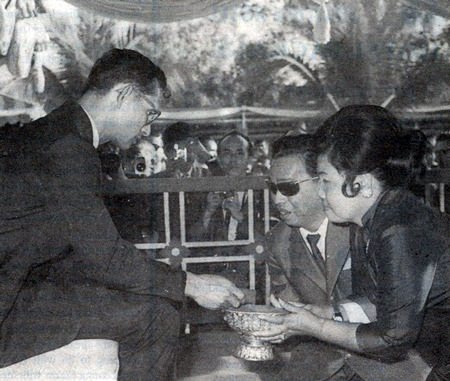
His Majesty the King presented Prateuang a special
award for his contributions to Thai music 30 years ago.
by Somkhuan Pholrat
The Lord Buddha taught that nothing is permanent. People’s
lives are constantly changing direction, like the course of a stream.
Buddha also reminded us that we come into the world with nothing and leave with
nothing. The purpose of our lives is to do good and beneficial works which we
can leave behind and take with us on our journey through the universal cycle.
Everyone agrees that this is a good philosophy.
Everyone also accepts that in the present day, money is god. It is the only
thing with which we can obtain almost anything. Money can even buy good looks.
There are two things that money cannot buy. One is true love and the other is
genius. Very few people are lucky enough to have these things and money too.
There is a genius living in Chonburi. Prateuang Boon-praphan, now 67 years old,
is one of Thailand’s greatest songwriters.
He has diabetes and low blood pressure and must visit the doctor twice a month
to stay alive, and is unable to care for himself. The person who has this
responsibility is his older sister Mrs. Amnuayporn Thantaranon, 73. His sister
has been his confidante and friend since the days when Prateuang was writing
many of Thailand’s ‘classic’ songs.
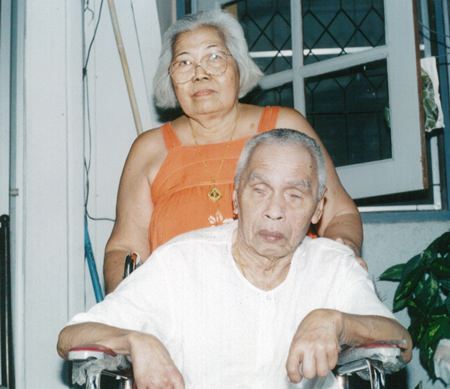
Geniuses as well as the poor
suffer from societies neglect.
Even today, she must take him to Somdej Hospital in Sriracha.
This is made even more difficult for the 73 year old sister as Prateuang is not
able to walk and must use a wheelchair. He is also totally blind.
He receives a bit of money from his adopted daughter, Ms. Chidchom Boonpraphan,
26, who lives in Bangkok. She sends Prateuang as much money as she can. Her
resources are limited though, as she must work and is studying in university at
graduate level. She visits Prateuang twice a month. The rest of the time, Mrs.
Amnuayporn must care for Prateuang herself because his best friend, singer Samai
Oonwong, is now dead.
Mrs. Amnuayporn told me that when her brother was healthy and able to write
songs, he had many loving friends in the entertainment industry. She said he was
a generous man with his friends and never denied a plea for help.
Prateuang’s sister con-tinued, saying that he had a spontaneous genius for
composing. Most so-called ‘composers’ of popular music plink on a piano or plunk
away at a guitar until their fingers stumble onto something. Prateuang’s
melodies came to him as spontaneous inspirations. Mrs. Amnuay said they often
came at inconvenient moments. He once wrote a melody on one of her handkerchiefs
while they were in the mountains, as he had no paper and was afraid that he
would forget it. A sunset, the motion of the sea, almost everything would cause
melodies to come into his head.
Many of the songs he wrote decades ago are being arranged and sung by today’s
singers, although the vocal ranges must be made narrower. In the past, Thai
singers were all thoroughly trained and had large ranges. Prateuang says he does
not mind this, although it does take something away from the drama and shape of
the melodies, as high phrases are always transposed down.
Prateuang wrote songs for singers such as Charin Nantanakorn, Suthep
Wongkanhaeng, Sawali Phakaphan, Thanin Intrathep, Ruangthong Thonglanthom, Yard
Naphalai and ML Thanatsri Sawatdiwat. These are the Thai equivalents of Frank
Sinatra, Sarah Vaughn, and Ella Fitzgerald. The list is so long that it is not
possible to list them all here.
These singers became identified with Prateueang’s songs, which made them famous.
Prateuang’s own favourite is Suthep Wongkhamhaeng who, aside from his singing
career, has been a member of parliament. Prateueang’s sister says he mentions
Suthep frequently and would like to see him again.
Prateuang has won several notable awards, one from His Majesty the King. His
Majesty presented Prateuang a special award for his contributions to Thai music.
This was about 30 years ago.
For a while, Prateuang suffered from loss of appetite but is now able to eat due
to an enlightened western style physician who has prescribed Chinese herbal
medicine to stimulate his appetite. As this medicine must be imported from
mainland China, it costs 2,000 baht a dose.
The other funds needed for Prateuang’s medical care come from old songs which he
wrote but did not publish. There are not many left, but companies are still very
willing to buy them. They pay him 10,000-15,000 baht a song. For this amount,
the purchaser receives full rights to the song and Prateuang receives no further
payment for performances or airplay.
Mrs. Suthanisa, or Khun Lek, of the Ban Dontri Music Company, takes care of the
sale of the songs. She said that Thai music producers take advantage of
composers and do not pay what a song is worth as they tell the composer they can
‘make a bad song a hit. All it takes it promotion.’
She takes care of all of Prateuang’s business as Prateuang and his sister are
busy trying to make ends meet. All the money is used to pay for health care
bills.
Sometimes, when they don’t have enough money, Mrs. Amnuay sells one of the few
valuables she has left.
Prateuang’s sister said the house they now live in was ‘mortgaged’ to a generous
businessman 2 years ago to obtain money to pay medical bills. The man has been
kind enough to tell them they could take all the time they needed to pay this
off. The money is now spent.
Prateuang asks that those who perform his songs to please think of their meaning
He feels sad that today all songs must fit into a certain ‘style’ for audiences
to accept them. He believes that singers should be able to sing a song according
to its character, like a good actor who can portray different personalities. He
does not like the practice of singers forcing a song into an often inappropriate
style to conform to their character.
He also said that if he knows that people are listening to his songs, it makes
his heart glad, even though he does not receive any financial benefit when they
are used.
It may be a rather vulgar comparison, but this is a classic example of music
companies who ‘kill the goose who lays golden eggs.’
Maybe they’re not killing it, but they are certainly keeping it on starvation
rations.
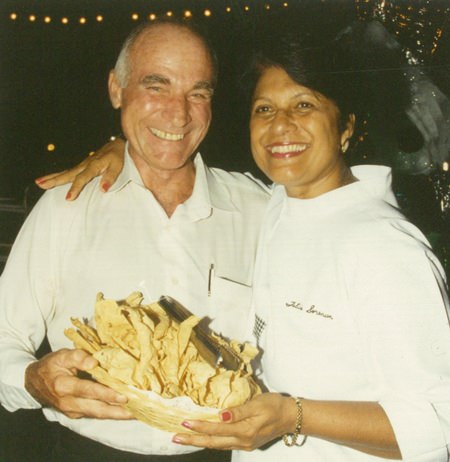
East meets West. Executive Chef Amari Orchid
Resort Samuel Lehmann and Felicia Sorensen.
by Elfi
I arrived a bit late at the cooking class in La Gritta
Restaurant, Amari Orchid Resort. Merry laughter greeted me, and then I heard
the strong voice of the ‘Precious Jewel’ giving advice on how to prepare
curries, and making jokes besides.
Sikhamani Felicia Wakwella Sorenson, a stunning woman,
isn’t actually a chef. She’s a self-made woman.
E: “You are the most charming chef I’ve ever met.”
F: “Because I’m not a chef. I have never worked in a
restaurant as a chef.”
E: “You must have gained your knowledge about cooking
somehow. Where did you get it?”
F: “I went from Sri Lanka to England to study. For quite
a while I worked as a qualified dietitian in a hospital. There I learned the
basics on how to cook European food. Later on I worked as a professional
model and I got married to the most charming Norwegian man.”
E: “I was wondering about your name. Sorenson
doesn’t sound very Sri Lankan.”
F: “You’re right, it isn’t. Anyhow, after we got married
we went back to Sri Lanka and lived on the most beautiful tea plantation. I
had 5 servants in my very luxurious house and everything one can ask for.
Being quite an energetic woman, I simply got bored after a while. Then I had
an idea. None of the Sri Lankan ladies knew how to prepare European food and
so I started to teach them. One thing led to another. I went to Hong Kong
and worked for the Hilton as an Assistant Manager, later I was Banquet
Manager at the Lee Gardens Hotel and until 1977 I was the Managing Director
of Felitex Fashion. Finally, since 1977 I have been the president of
Felicia’s Kitchen in Sri Lanka. I have done all that besides giving cooking
lessons to foreign ladies there. Of course, not about European food, but to
teach them how to cook Sri Lankan food. I brought all the spices with me and
sold them after the classes to my students. Soon enough I had to deliver the
spices to a lot of hotels and Delis.
“One day, the Hilton asked me to put together a
promotion. You know - a big show, with plenty of reporters around, and after
that other hotels became aware of me. That’s how I became famous. Star TV
asked me to give cooking lessons via television and soon I started traveling
all over the world promoting food from Sri Lanka. During my spare time I
wrote a book: ‘The Exotic Taste of Paradise’. See, I did what I always
wanted to do: 1. Get famous, 2. Write a book, 3. Be a self-made woman.”
E: “A self-made woman you are and a real special one.
Haven’t you ever been afraid, not being a chef, to make shows in front of
such a big audience?”
F: “If I do something, I’ll go all the way. I am lucky to
have a personality, I’ll always manage. Being a model before, I know how to
walk, to act and to present myself. That has helped a lot. I’ve made shows
on television in Austria, (your home country I believe. Oh, I just had a
marvelous time in Vienna), Australia, Guam, Hawaii, Hong Kong, India,
Indonesia, Japan, Korea, Macao, Malaysia, Oman, Philippines, Singapore,
South Africa, Sri Lanka of course, Thailand and the USA.”
E: “That saves me one question: to how many countries you
have been. Traveling around so much, have you ever had time to taste food
from all the countries you went to?”
F: “Of course. This is very important. But,” she laughs,
“believe me, I don’t go to fancy places to learn about food. I’m usually
sitting on the beach, talking to native women, or many times I just walk
into their houses and ask them to show me how they cook. I always have some
small presents to exchange for the lessons I get.” She smiles sweetly, “You
wouldn’t believe how friendly people are. Many women are quite happy when
someone pays attention to them.”
E: “I am sure, with your friendly and charming attitude,
nobody can resist you.”
F: “I guess you are right. I am not overly educated. I am
street-wise and a typical Aries. I want to be a leader, not a follower and
still, wherever I go, I play the female part. You know, asking guys for
their help. All you need to do is delegate and you get all the help you
need.”
E: “I sure believe you can twist the guys around your
little finger. How many awards or trophy’s have you got so far?”
F: “Well, a few. In 1980 I received the Escoffier Award
Les Disciples d’Auguste Escoffier. I became the Confrerie de la Chaine de
Rotisseurs in Sri Lanka, I was a guest chef at the Resort Mondavi Winery at
the Great Chefs Weekend Event, I was a guest chef on Seabourne Spirit Cruise
Line and I am the food consultant to 10 hotels and restaurants. But the
greatest honor I received was from the president of Sri Lanka.”
E: “What was that?”
F: She smiles proudly and tells me: “I got the Sri Lanka
Presidential National Honours. I was knighted on 22 May 1992 on National Day
by President Premadasa. I got the title: ‘Sikhamani’ which means ‘Precious
Jewel’. This was in recognition of my single-handed promotion of Sri Lankan
food all over the world. I was the first one ever to receive this honor in
the field of cooking, even though I had spent 30 years in Hong Kong.
E: “Congratulations. You can be very proud. What about
the other women of Sri Lanka? You seem to be so different from them. Are
they jealous of you or do they still accept you the way you are?”
F: “I was always different than the other woman back
home. That’s why I went to study abroad after my first marriage with a Sri
Lankan man broke up. I never could imagine being the very obedient wife
only. I always wanted to be me. You have to see it like this: Everybody
loves a winner. People are not jealous of me, they think I am a star. That
gives me a big advantage. Even both my former husbands accept that fact and
we are still very good friends.
However, please don’t believe I feel I am a star myself.
I don’t drive a big car or need other signs to show off who I am. Every day
I thank Buddha for giving me so much luck and pleasure in life. I thank him
for every little bit. I believe someone has to be happy with small things,
never be angry, jealous or envious. It shows in your behavior and your face.
People want to see happy people. I guess people understand me, understand
what I want to be. I am me, though somehow I am a star, and though I love
luxury, I am still humble.”
E: “What a wise word from a great lady. Now my next
question: is this the first time for you in Pattaya?”
F: “No. I love Pattaya. I came here for the first time in
1972. Since then I’ve spent many of my vacations here. I have good friends
in Pattaya.”
E: “Can you see any changes in Pattaya?”
F: “Definitely. When I came here the first time, Pattaya
was a dreamy fishing village and it still was the place to spend your
vacation, especially for the foreigners who lived in Hong Kong. Within a few
years Pattaya grew much too fast and with it came all the problems due to
wrong planning. Now, Pattaya still struggles but it has become much better
within the last three, four years. It’s such a busy, big town now.
Unbelievable, when someone used to know it before. I believe Pattaya is on
the right track now. I hope so, for I’d love to come back all the time.”
E: “We all hope you’ll be back many more times. How about
retiring. Do you ever consider it?”
F: “No way! I’d like to become more famous. I love my
work and I’ll be probably doing it for the rest of my life.”
E: “Thank you so much for giving me the opportunity to
talk to you. It was a great pleasure for me and I sure hope to see you again
soon.”
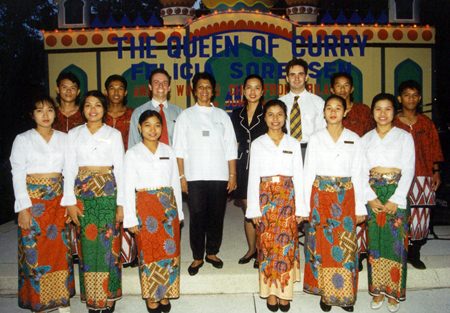
Felicia with the management
and staff in Sri Lanken costumes.
Find of rare proof King Rama V medal illuminates historic tour
by Michael Brady
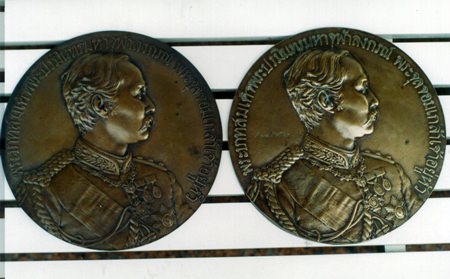
Two 25 cm commemorative 1897 Rama V Royal
Tour bronze medals.
King Chulalongkorn (Rama V) could not have known it at the time, but in
one sitting, nearly one hundred years ago on 17 September 1897, he set
the course that was to forever change one of the most ordinary items of
everyday life in Thailand: its coins.
On the previous day, the King had visited Monnaie de Paris (The Paris
Mint). He had been so impressed by the exquisite engraving of the coins
produced there that he requested that The Mint strike a medal
commemorating his eight-month royal tour of Europe. The Mint obliged,
and offered the services of its Chief Engraver of Coins, Henri Auguste
Jules Patey, an artisan just three years younger than King Rama V, then
three days short of his 44th birthday.
There’s no record of the conversation between King Rama V and artisan
Patey, although the King did describe it later in a letter to his
daughter, Princess Nipha. But the King and the artisan must have found
rapid rapport in their common denominator of appreciation of the arts in
technology. Mr. Patey modelled King Rama V in a record single sitting,
and thereafter rapidly produced a proof medal 50 mm in diameter. The
King was so pleased with the work that he asked that it also be issued
in reduced 30 mm size, so it could be hung on a ribbon and worn as a
decoration. Both the 50 mm and the 30 mm medals were then struck in
gold, silver and bronze.
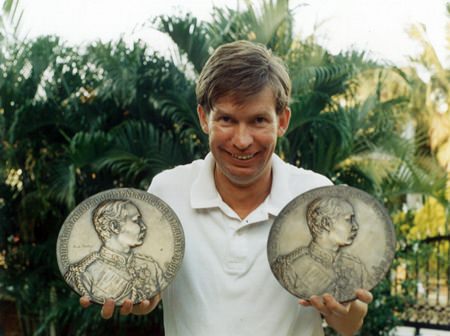
Jan Olav Aamlid holding two 25 cm
commemorative 1897 Rama V Royal Tour bronze medals.
The design of the medals is beautiful yet simple. Around the rim, there
is an inscription in French which reads MONNAIE DE PARIS, BRONZE. The
obverse shows King Rama V facing right with his name round the edge. The
reverse bears an inscription in Thai that in translation reads To
Commemorate the Royal Tour of Europe from April 7 to December 16,
Rattanakosin 30 Era 116.
Unique confirmation of the historic sitting has just come to light in
France. Two bronze medallions, 25 cm in diameter, that feature the
obverse design of the commemorative medals have been purchased by Mr.
Jan Olav Aamlid, a recognised expert on the coins and medals of Thailand
and a resident of Pattaya for part of the year.
Mr. Aamlid explains that the large medallions are not freaks, but a
result of the production process used at the Paris Mint at the time the
smaller medals were struck. “First, Patey modelled King Rama V from life
in a wax relief, 25 cm in diameter. Then a negative plaster cast was
made of the wax relief. In the third stage, the Thai lettering was
inscribed in the plaster negative. Then a plaster positive was made and
Patey’s signature was added. The final stage of full-size working
comprised making a plaster negative and coating it with graphite to make
an electroformed copper negative. From there, reducing machines cut the
dies of the 50 mm diameter and 30 mm gold, silver and bronze medals. The
large medallions were cast directly in the third stage plaster mould of
the obverse. Each has a small metal loop attached to its reverse near
the uppermost edge, so obviously the medallions were intended to hang on
walls”.
The find of the two medallions is nigh unique, as only ten of them are
known to exist, whilst hundreds of the 50 mm and 30 mm medals are in
public and private collections. In addition, though rare, a 41 mm
diameter silver medal commemorating the royal visit and depicting The
Mint on its obverse is still more numerous than the large bronze
medallions. Mr. Aamlid admits that the historic value and rarity of the
medallions is reflected in their value, “around a hundred thousand
dollars each”.
Aside from the worth of his find, Mr. Aamlid points to the far-reaching
consequences of King Rama V’s 1897 visit to the Paris Mint. In 1897, the
Thai monetary system converted to the decimal system, as used in France,
and was based on the Baht, divided into 100 Satang. In the years that
followed, Patey and the Paris Mint produced the bulk of the new designs
for Thai coins. Most notably, artisan Patey designed the patterns of the
1908 - 1910 silver Baht, Half Baht and Quarter Baht coins.

